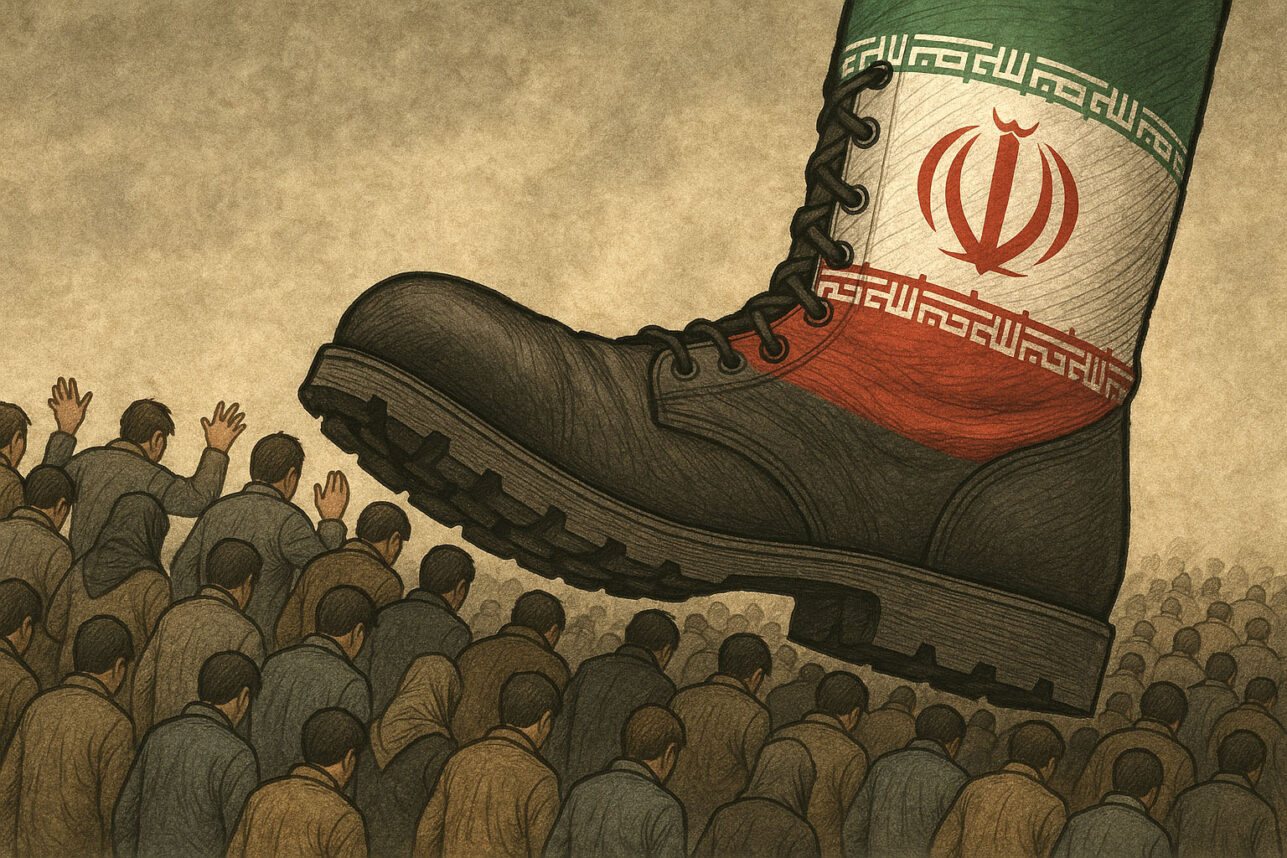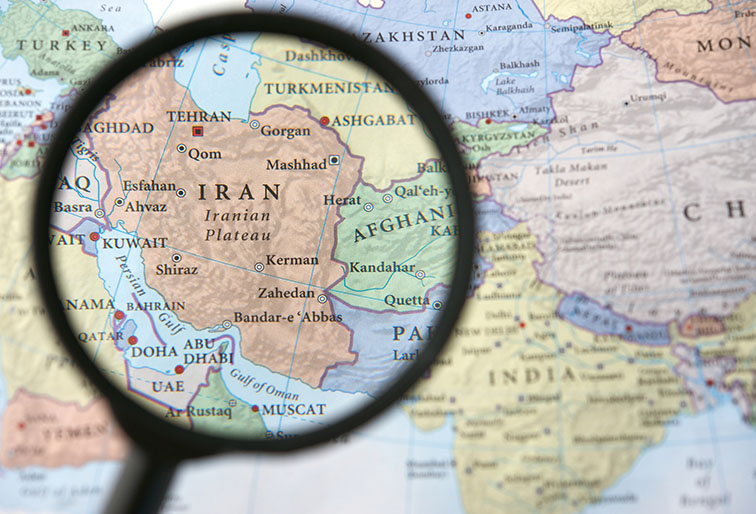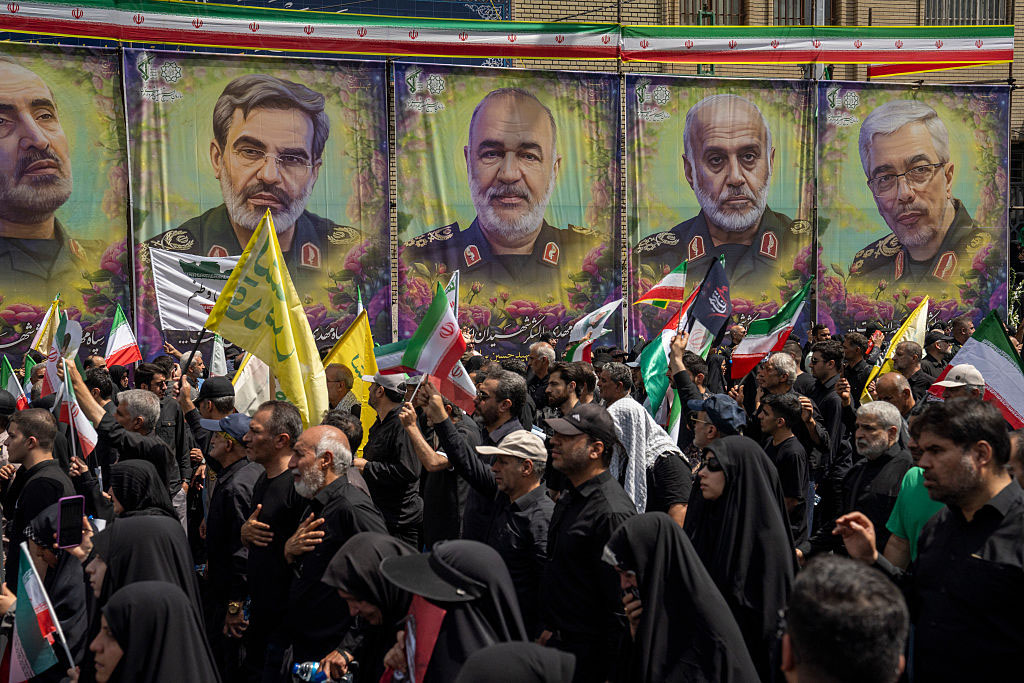
Being a pro-Israel advocate often means waiting for the other shoe to drop. For example, last week, while walking on Wilshire Boulevard, I wanted to approach an Armenian man protesting outside the Turkish Consulate in honor of Armenian Genocide Remembrance Day, and to let him know that the 1915 genocide against 1.5 million Armenians resonated deeply with me as a Jew. But as soon as I approached the man, I noticed he was holding a poster that read, “Armenians for Palestine.”
I get it (partially). Unlike the United States, Israel still hasn’t officially recognized the Armenian Genocide. And it has good relations with Armenia’s enemies, Turkey and Azerbaijan. But standing outside the Turkish Consulate, I wasn’t delusional for hoping that Armenian protestors focused, well, on Turkey, rather than Palestine.
So I didn’t approach the man. Instead, I picked up the metaphoric shoe that had dropped and went on my way.
Months ago, I had respect for members of a newly-formed Iranian (exile) opposition group that has formed a coalition to help free Iran. That included a man named Hamed Esmaeilion. And then, during an anti-regime demonstration in Brussels in late February, an Israeli journalist claimed that when she asked Esmaeilion if he would give an interview to Israeli media, he responded that he would not.
George Haroonian, an L.A.-based Iranian Jewish activist and community leader, knows the Israeli journalist, who has chosen to remain anonymous, and Haroonian confirmed the exchange between her and Esmaeilion with me. Haroonian is the co-founder of notoantisemitism.org, a website that educates Persian-language readers about antisemitism.
In March, Haroonian sent Esmaeilion an open letter on Twitter (@AntisemitismTo) regarding his anti-Israel past. For example, in July 2018, Esmaeilion tweeted a quote by the late antisemitic Palestinian leader, Yasser Arafat, about the Middle East. In April 2015, Esmaeilion, who lives in exile in Canada, tweeted, “Don’t let Canada become a colony of Israel.”
A colony of Israel? Are there other colonies of Israel worldwide? If so, which one has the best, hole-in-the-wall shawarma stand? I’ll reserve a flight tomorrow.
Before reading Haroonian’s letter, I wanted to support Esmaeilion. And I sympathized with him; the man lost his wife and 9-year-old daughter, who were killed by the Iranian Revolutionary Guard Corps (IRGC) in January 2020, when they shot down a Ukrainian International Airlines Flight in Tehran that was bound for Kyiv, killing all 176 on board.
There are few people in the world who hate the IRCG more than Esmaeilion. But could I support someone who wants to free Iran, but has an aversion to Israel? As usual, the other shoe dropped.
Some days, it seems as though I collect enough metaphoric shoes to render me a West L.A. cobbler.
Call it anti-Zionist intersectionality. Or thinly-veiled antisemitism. Or plain ignorance. Whatever it is, it sure is hard for me to get behind a cause if the person supporting it is unabashedly anti-Israel.
That’s why last month’s historic and first-time visit of Crown Prince Reza Pahlavi, son of Iran’s last secular leader, the Shah of Iran (who died in 1980) and his wife, Princess Yasmine, meant so much to me and thousands of Iranian Jews worldwide.
“Today was the best day of my life,” my father, who lives in L.A., declared on the day Pahlavi and his wife arrived in Israel. When I reminded my father that the best day of his life was when I was born (and my sister’s birthday and, let’s hope, his wedding day), he responded, “Of course. That goes without saying. But I’ve waited decades for this.”
Karmel Melamed, an L.A.-based attorney, journalist and Iranian Jewish activist, put it best: He told me that Pahlavi’s visit to Israel, which is home to the largest Iranian Jewish diaspora in the world (estimated at over 200,000), was nothing short of “healing” for a community that escaped Iran and has had to watch its former homeland terrorize Israelis through proxies abroad.
I believe that in Israel, Pahlavi and his wife, who live outside Washington, D.C., were treated better than they have ever been treated anywhere in the world, simply because of what the man means to Iranian Jews in particular. But not everyone was enamored by his visit. In Haaretz, Israeli journalist Yossi Melman called Pahlavi’s visit a “cynical use of the Holocaust.” The many photos of Pahlavi with Prime Minister Bibi Netanyahu probably didn’t win over many in Israel who loathe Bibi, either.
But I wonder how many Israeli journalists spoke with Jews of Iranian descent in Israel regarding the historic visit. For many of them, Pahlavi’s presence was, in the words of Melamed, healing, especially given the painful reality of living in the Middle East, where religious fanatics often crush seeds of progress and tolerance before they even sprout.
Consider the contrast: Whereas the Iranian regime hosts Holocaust cartoon contests and its Supreme Leader, Ayatollah Ali Khamenei, repeatedly denies the Holocaust on Twitter, Pahlavi and his wife arrived in Israel on Yom HaShoah and visited Yad Vashem. Whereas Iran has killed thousands of Israelis and Jews via terrorist proxies, Pahlavi met with and embraced Rabbi Leo Dee, whose wife and two of his daughters were killed in a terrorist attack in April. Whereas the regime forces its Jewish community to protest against Israel on the annual “Quds Day,” Pahlavi and his wife visited the Kotel (Western Wall) in Jerusalem, where they touched their foreheads to the warm, ancient stones and undoubtedly prayed for a free Iran.
Whereas the Iranian regime hosts Holocaust cartoon contests and its Supreme Leader, Ayatollah Ali Khamenei, repeatedly denies the Holocaust on Twitter, Pahlavi and his wife arrived in Israel on Yom HaShoah and visited Yad Vashem.
For me, the most powerful moment of Pahlavi’s visit occurred when he drew a connection to ancient Persia’s King Cyrus the Great, a Zoroastrian who offered to liberate his Jewish subjects to return to Jerusalem and build the Second Temple. Pahlavi tweeted, “2,500 years ago, Cyrus the Great liberated the Jewish people from captivity and helped them rebuild their Temple in Jerusalem. It is with profound awe that I visit the Western Wall of that Temple and pray for the day when the good people of Iran and Israel can renew our historic friendship.”
Consider that the first order of business by the 1979 Iranian Islamic Revolutionary leader Ayatollah Ruhollah Khomeini was to declare Israel an official enemy of Iran (“The Little Satan”) and to make Zionism a capital offense. The first foreign “dignitary” (I use that term lightly) to visit Khomeini was Yasser Arafat. No wonder Israelis, especially Iranian Israelis, showered Pahlavi with rose petals on his visit.
Yes, rose petals. During one event, as Pahlavi and Princess Yasmine walked a red carpet, Israelis threw rose petals at them. Seemingly everywhere they went, the Iranian imperial national anthem (pre-revolution) was played.
I broke down and sobbed when I watched that particular video of the royal couple. There’s something about the imperial national anthem; it’s just that, imperial. Listen to it on YouTube and you’ll know what I mean. The other anthems, of which there have been several since the 1979 revolution, are so dark.
Call me sentimental. Or naive (or disqualified from being able to write for Haaretz). But that anthem pulls at my soul. And I suspect it has this effect on many others as well, even those who, like me, belong to a younger generation of Iranians who never lived during the Shah’s reign.
In the last 44 years since the revolution, Israeli and American flags have been placed on the ground at the entrances of Iranian schools and universities so that they would be trampled. In Israel, Reza Pahlavi and his wife walked over rose petals. If that’s not one of the most powerful contrasts between what the Middle East is, and what the Middle East could be, I don’t know what is.
Tabby Refael is an award-winning weekly columnist for The Jewish Journal, and an LA-based speaker and civic action activist. Follow her on Twitter and Instagram @TabbyRefael.


































 More news and opinions than at a Shabbat dinner, right in your inbox.
More news and opinions than at a Shabbat dinner, right in your inbox.